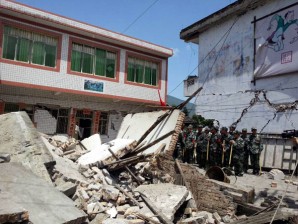Strong quake jolts China’s Sichuan, killing 113

In this photo released by China’s Xinhua news agency, buildings are destroyed by a powerful earthquake at Gucheng village of Longmen Township of Lushan County in Ya’an City, southwest China’s Sichuan Province, Saturday, April 20, 2013. The powerful earthquake jolted Sichuan province Saturday near where a devastating quake struck five years ago. AP
BEIJING—A powerful earthquake struck the steep hills of China’s southwestern Sichuan province on Saturday, leaving at least 113 people dead and more than 2,600 injured, nearly five years after a devastating quake wreaked widespread damage across the region.
Saturday’s quake, while not as destructive as that in 2008, toppled buildings, triggered landslides and disrupted phone and power connections in mountainous Lushan county. The village of Longmen was hit particularly hard, with authorities saying nearly all the buildings had been destroyed and state television showing footage of soldiers digging through rubble.
Rescuers turned the square outside the Lushan County Hospital into a triage center, where medical personnel bandaged bleeding victims, according to footage on China Central Television. Rescuers dynamited boulders that had fallen across roads to reach Longmen and other damaged areas lying farther up the mountain valleys, state media reported.
The official Xinhua News Agency, citing the Sichuan earthquake bureau, said at least 113 people had died. The government of Ya’an city, which administers Lushan, said in a statement that more than 2,600 people were injured, 330 of them severely.
The quake — measured by China’s seismological bureau at magnitude 7.0 and the U.S. Geological Survey at 6.6 — struck the steep hills of Lushan county shortly after 8 a.m., when many people were at home, sleeping or having breakfast. People in their underwear and wrapped in blankets ran into the streets of Ya’an and even the provincial capital of Chengdu, 115 kilometers (70 miles) east of Lushan, according to photos, video and accounts posted online.
Article continues after this advertisementThe quake’s shallow depth, less than 13 kilometers (8 miles), likely magnified the impact, and CCTV showed footage from local security cameras that were shaking. Chengdu’s airport shut down for about an hour before reopening, though many flights were canceled or delayed, state media said.
Article continues after this advertisementLushan, where the quake struck, lies where the fertile Sichuan plain meets foothills that eventually rise to the Tibetan plateau and sits atop the Longmenshan fault. It was along that fault line that the devastating magnitude-7.9 quake struck on May 12, 2008, leaving more than 90,000 people dead or missing and presumed dead in one of the worst natural disasters to strike China in recent decades.
“It was just like May 12,” Liu Xi, a writer in Ya’an city, who was jolted awake by Saturday’s quake, said in a message posted to his account on Sina Corporation’s Twitter-like Weibo service. “All the home decorations fell at once, and the old house cracked.”
Xinhua said the well-known Bifengxia panda preserve, which is near Lushan, was not affected by the quake. Dozens of pandas were moved to Bifengxia from another preserve, Wolong, after its habitat was wrecked by the 2008 quake.
As in most natural disasters, the government mobilized thousands of soldiers and others — 7,000 people by Saturday afternoon — sending excavators and other heavy machinery as well as tents, blankets and other emergency supplies. One soldier died after the vehicle that he and a dozen others were in slipped off the road and rolled down an embankment, state media reported.
Premier Li Keqiang flew to Ya’an to direct rescue efforts, and he and President Xi Jinping ordered officials and rescuers to make saving people the top priority, Xinhua said.
With roads blocked for several hours after the quake, the military surveyed the disaster area by air. Aerial photos released by the military and shown on state television showed individual houses in ruins in Lushan and outlying villages flattened into rubble. The roofs of some taller buildings appeared to have slipped off, exposing the floors beneath them.
A person whose posts to the micro-blogging account “Qingyi Riverside” on Weibo carried a locator geotag for Lushan said many buildings collapsed and that people could spot helicopters hovering above.
China Earth Administration said there had been at least 35 aftershocks, including at least two of magnitude 5.0 or higher.
“It’s too dangerous,” said a person with the Weibo account Chengduxinglin and with a Lushan geotag. “Even the aftershocks are scary.”
While rescuers and state media rushed to the disaster scene, China’s active social media users filled the information gap. They posted photos of people rushing to streets for safety and of buildings flattened by the quake. They shared information on the availability of phone services, apparently through data services.